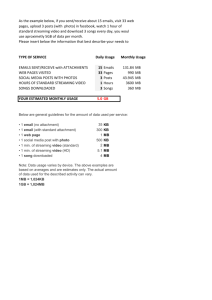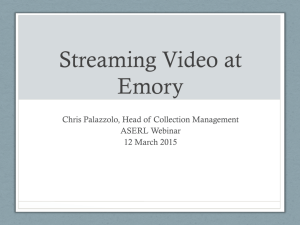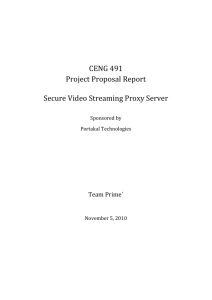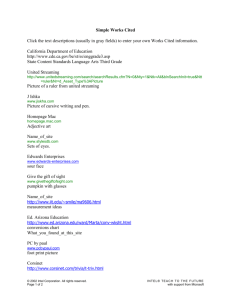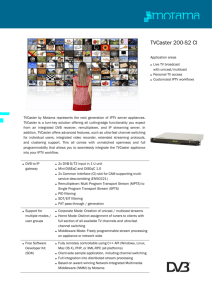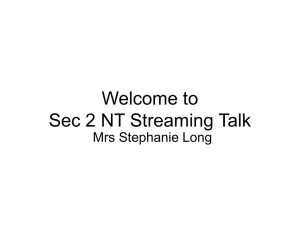File streaming ppt - University of Reading
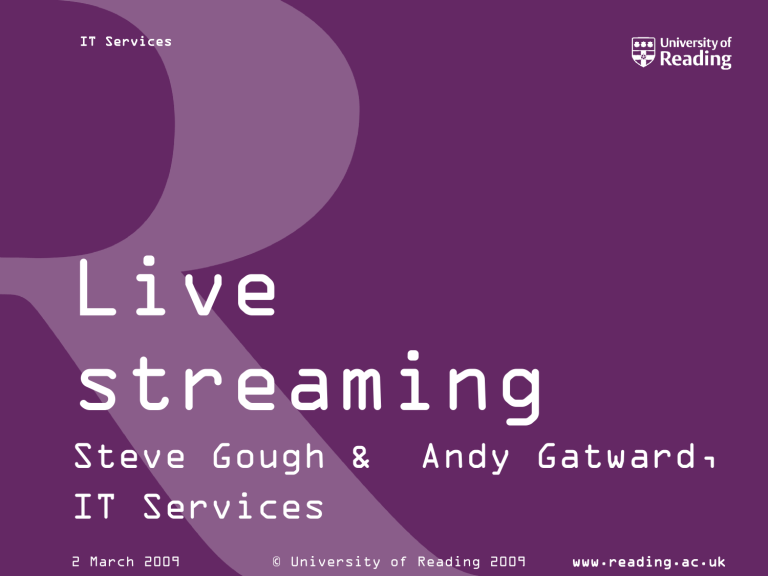
IT Services
Live streaming
Steve Gough & Andy Gatward,
IT Services
2 March 2009 © University of Reading 2009 www.reading.ac.uk
What we’ve tried
• Camtasia
– record PPT & audio
• Chris Wakelin’s security presentation
(16/2/09)
• video recording
– my software licensing presentation (2/2/09)
• some video editing required to insert slides into video
• live streaming
– IT Supps conference (31/3/09)
Live streaming 2
What do we want?
• record of session
– slides
• minimum requirement
– audio
– video
• how useful is it to see presenter?
– record of Q&A
Live streaming 3
What do we want?
• remote participation
– live streaming
• for conference
– camera pointed at projection screen and lectern
– microphone for presenter
– feedback channel
• for asking questions & reporting problems
(“we can’t hear”)
• MSN, Elluminate, BB virtual classroom, ...
• load slides into this too?
– “+1” service?
• streaming delayed by an hour
Live streaming 4
Speakers
• comfortable with being recorded?
– mistakes
• e.g. my licensing presentation
• permission?
Live streaming 5
Other things to consider
• lecture capture
– growing number of rooms with ceiling mounted cameras
• Chemistry, Carrington, ICMA, Business
School
– needs to be easy to use
• Chemistry & Carrington aren’t
• digital signage
– growing number of signage screens
– Samsung MagicNet not easiest system to use
Live streaming 6
Technical details
• over to Andy Gatward…
Live streaming 7
Clarifications
• Lecture capture has different requirements to live broadcast
• Live broadcast should be:
– Recordable
– Secure
– Low delay
– Good quality
Live streaming 8
Systems in use currently:
• Live broadcast:
– Elluminate
– MediaSite
– RealNetworks
– Windows Media
– IPTV Platform
• Lecture capture:
– Camtasia
– MediaSite
– Replay
• Media distribution:
– RealNetworks
– Windows Media
– YouTube
– iTunesU (coming)
– IPTV Platform
• This is a support nightmare!
Live streaming 9
Standards
• Need to find common standard
– Live broadcast in IPTV format
• Viewable using software or hardware clients
• Can be integrated easily into IPTV pilot
• Easy to record and transcode for use on other systems
– Recorded media in format that can be read by all platforms
• Avoid proprietary codecs
• But may incur license costs
• Needs to be easy to transcode back to IPTV format
Live streaming 10
Standards
• Digital Video Broadcasting (DVB) format
– MPEG2 Transport Stream
– MPEG2 or MPEG4 video
• MPEG2 video most common
• MPEG4.2 (MPEG4) video used in Europe
• MPEG4.10 (H.264) video used for HDTV
– MPEG2, MP3 or MPEG4 audio
• MPEG2 audio used on broadcast TV
• MP3 audio used on DAB radio
• MPEG4 audio (AAC) used for HDTV
– Plus a number of other things to make it work
Live streaming 11
DVB format
MPEG2-TS
Program PSI
PS PS PAT PMT PCR
Live streaming 12
Standards
• Recorded format
– MPEG4 container (.MP4 file)
• Must include ‘hinting’ or cannot be streamed
– MPEG4 video
• MPEG4.10 (H.264) gives best quality
• But if using this, should only use ‘simple profile’ for maximum compatability
– MP3 or MPEG4 audio
• MP3 lower bit rate
• MPEG4 (AAC) gives better quality
Live streaming 13
Live broadcast IPTV style
Live streaming 14
Broadcast encoder
• Looked at commercial solutions
– Very nice but very expensive
– Can be quite complex to configure
– £1,250 + VAT for PAL 4:3 MPEG2 encoder
• So built our own as a trial
– Intel Atom dual-core system, 1GB RAM, mini
ITX, LCD display
– Hardware MPEG2 encoder card but also investigating DV input
– Custom built Linux distribution booting from
CompactFlash
– VideoLAN software used to format and send stream to head end
– Linux + VideoLAN fits in 142MB of storage
– Total cost: £350 + VAT
15
Security
• Need to prevent third parties injecting their own content
– Head end has UDP ports open to receive content
– Ports need to be open to entire campus LAN for flexibility
• Use encryption between encoder and head end
• Be careful with multicast scope
– Should be limited to organisation boundaries unless intended to reach a public audience
– Use addresses in 239.254.0.0/16 to reach
ReadingConnect
– Use addresses in 239.253.0.0/16 for campus
16
Head end
• VideoLAN and miniSAPserver on Linux system
• VideoLAN
– Used to decrypt feed from encoder and relay to multicast group
– Also bridges data to a unicast RTSP feed
– Can optionally record and transcode
• E.g. IT Supporters conference
• miniSAPserver
– Announces sessions to clients
– Required for Set Top Boxes
– Useful for software clients
Live streaming 17
Recording from live broadcasts
• VideoLAN configured to save file as:
– MPEG4 container
– MPEG4.10 (H.264) video
– MPEG4 (AAC) audio
• RealNetworks streaming server can read these files
– But they must be hinted first
– So there is a single step between saving and streaming
– But VideoLAN developers have plans to incorporate hinting
• iTunesU can use these files directly
• Simple step to convert for YouTube
Live streaming
(Flash Video)
18
Client side
• Set top box
– Don’t have any of these yet
– But looking to evaluate some in conjunction with external partner, Move Networks
(formerly Inuk Networks)
– LAN in, video out
– Centrally managed (DHCP, settings, firmware)
– Dumb devices, boot from multicast
– Content appears as just another channel
Live streaming 19
Client side
• VideoLAN
– Free and full-featured
– Developed by people in over 20 countries
– Open source
– Started at École Centrale Paris
– Contributions from the likes of BBC R&D and
BT
– Used extensively at other Universities
– Skinnable so can be made user friendly
Live streaming 20
Client side
• Integration with Move Networks “Igloo” client
– Software set top box platform
– Will be used on readingConnect to provide
IPTV service
– Content appears as just another channel
– Need to look at how to provide electronic program guide (EPG) data
Live streaming 21
Demos
• Move Networks IPTV client
• Sneak preview of IPTV platform for campus
Live streaming 22
